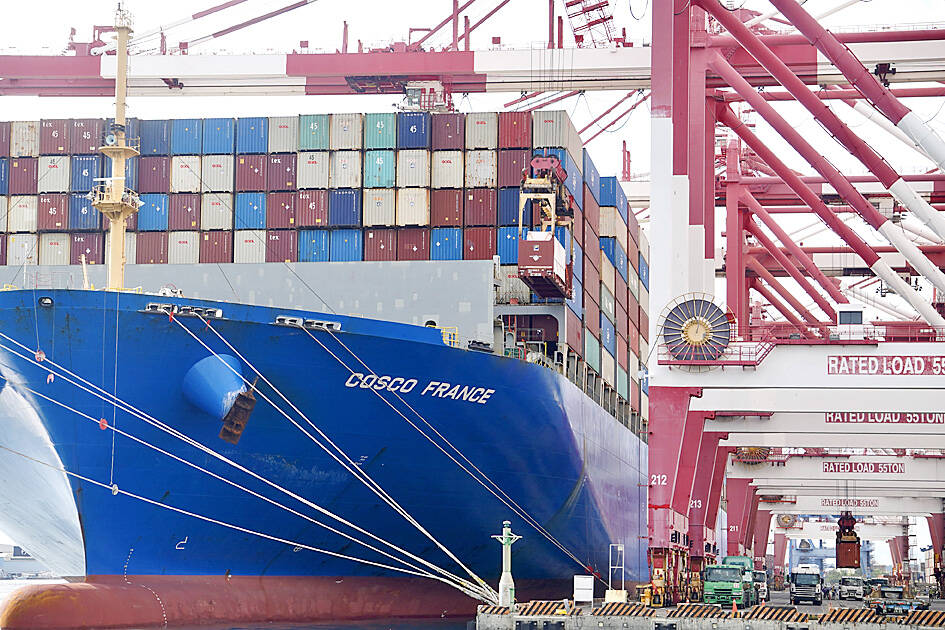The proportion of Taiwan’s exports directed to China, including Hong Kong, declined by more than 12 percentage points last year compared with its peak in 2020, the Ministry of Finance said on Thursday last week.
The decrease reflects the ongoing restructuring of global supply chains, driven by escalating trade tensions between Beijing and Washington.
Data compiled by the ministry showed China and Hong Kong accounted for 31.7 percent of Taiwan’s total outbound sales last year, a drop of 12.2 percentage points from a high of 43.9 percent in 2020.

Photo: CNA
In addition to increasing trade conflicts between China and the US, the ministry said the decline reflected a weakening Chinese economy caused by a fragile property home market and falling domestic demand.
The ministry said a fall in exports to China also came as the Chinese government intensified efforts to push for the “Made in China 2025” initiative to replace imported goods with those made domestically.
The reduction in exports last year was largely made up of petrochemical, base metal and machine tool suppliers due to a supply glut in the Chinese market, the ministry said.
Taiwan’s exports of traditional electronic components to China, such as printed-circuit boards and diodes, also declined last year compared with 2020, it said.
In contrast, sales of high-end integrated circuits and graphics processing unit (GPU) cards, which are used in artificial intelligence applications, increased over the same period.
As exports to China fall, Taiwan has forged closer ties with the US and ASEAN to diversify their markets and reduce dependence on China, the ministry said.
Taiwan’s exports to the US surged 120 percent last year compared with 2020, reaching US$111.4 billion, the ministry said.
The growth was primarily driven by computer electronics — including servers and GPU cards — which rose 640 percent, and semiconductors, which increased 360 percent in that period.
Exports to the US comprised 23.4 percent of Taiwan’s total last year, up from 14.6 percent in 2020, according to the ministry.
Exports to ASEAN made up 18.5 percent, up 3.1 percentage points from 15.4 percent in 2020, largely due to an increase in sales of computers and related products, as well as semiconductors, the ministry said.

South Korea’s equity benchmark yesterday crossed a new milestone just a month after surpassing the once-unthinkable 5,000 mark as surging global memory demand powers the country’s biggest chipmakers. The KOSPI advanced as much as 2.6 percent to a record 6,123, with Samsung Electronics Co and SK Hynix Inc each gaining more than 2 percent. With the benchmark now up 45 percent this year, South Korea’s stock market capitalization has also moved past France’s, following last month’s overtaking of Germany’s. Long overlooked by foreign funds, despite being undervalued, South Korean stocks have now emerged as clear winners in the global market. The so-called “artificial intelligence

NEW IDENTITY: Known for its software, India has expanded into hardware, with its semiconductor industry growing from US$38bn in 2023 to US$45bn to US$50bn India on Saturday inaugurated its first semiconductor assembly and test facility, a milestone in the government’s push to reduce dependence on foreign chipmakers and stake a claim in a sector dominated by China. Indian Prime Minister Narendra Modi opened US firm Micron Technology Inc’s semiconductor assembly, test and packaging unit in his home state of Gujarat, hailing the “dawn of a new era” for India’s technology ambitions. “When young Indians look back in the future, they will see this decade as the turning point in our tech future,” Modi told the event, which was broadcast on his YouTube channel. The plant would convert

‘SEISMIC SHIFT’: The researcher forecast there would be about 1.1 billion mobile shipments this year, down from 1.26 billion the prior year and erasing years of gains The global smartphone market is expected to contract 12.9 percent this year due to the unprecedented memorychip shortage, marking “a crisis like no other,” researcher International Data Corp (IDC) said. The new forecast, a dramatic revision down from earlier estimates, gives the latest accounting of the ongoing memory crunch that is affecting every corner of the electronics industry. The demand for advanced memory to power artificial intelligence (AI) tasks has drained global supply until well into next year and jeopardizes the business model of many smartphone makers. IDC forecast about 1.1 billion mobile shipments this year, down from 1.26 billion the prior

People stand in a Pokemon store in Tokyo on Thursday. One of the world highest-grossing franchises is celebrated its 30th anniversary yesterday.